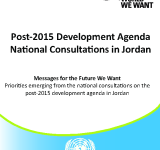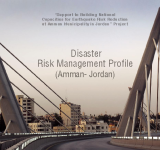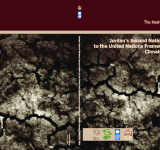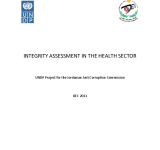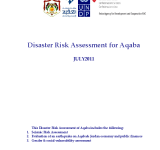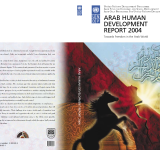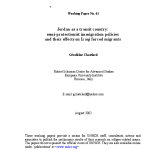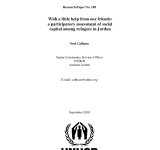Jordan is one of the 88+ countries which carried out national consultations worldwide. 10 countries from the Arab region were selected to run the post-2015 national consultations: Jordan;; Djibouti;; Egypt;; Morocco;; Sudan;; Algeria;; Yemen;; Iraq;; Saudi Arabia;; and Lebanon. The Jordanian national consultations have been a lead contributor to the first preliminary report of the UN Development Group (UNDG) issued in March 2013 and entitled “The Global Conversation Begins – Emerging Views For a New Development Agenda”;; and also to the UNDG Global report “A million voices: The World We Want”;; launched by the UN Secretary-General and UNDG Chair on 9 September 2013. The Global Report constitutes a milestone in the dialogues to shape the post-2015 development agenda. Its findings have contributed to the UN Secretary-General’s report to the 68th session of the General Assembly in September 2013.
Jordan
This report was prepared by the General Directorate of Civil Defense and the United Nations Development Programme in 2008. It provides an overview of Jordan and its demographic;; economic;; social and cultural characteristics. In addition it presents legislation and its effectiveness;; relevant to land use management;; vulnerability to hazards and the disaster risk management arrangements in place. It concludes with the disaster risk management vision of Jordan.
This report is the result of the long;; tedious and creative work of many Jordanian experts who together have reflected the most comprehensive outlook about climate change in the Jordanian context and outlined Jordan’s efforts in addressing the phenomena and the impacts of climate change. Whether in greenhouse gas inventory;; adaptation and mitigation options the readers of this report will find answers about Jordan’s minor contribution in emissions and major vulnerability to climate change impacts
The report looked specifically at the areas of public mainly Ministry of Health (MoH) procurement of medications and medical devices and supplies. Accordingly a number of methodologies were being used to identify potential areas of integrity weakness in the public procurement processes. The existence of an effective functioning procurement system is dependent on the transparency of the processes;; and ability to hold individuals;; entities and personnel accountable for adhering to standard procedures;; norms;; laws;; by-laws and regulations in each of these functions. The approach to be taken in this assessment is to focus on the level of integrity rather than to deal purely with identifying corruption
This evaluation uses the findings of the seismic risk assessment (Jordan Royal Scientific Society) in order to provide a comprehensive overview of the costs of an earthquake impacting mainly Aqaba city and slightly in the southern area close to the Jordan‐Saudi border. It only considers an earthquake occurring under the Aqaba Fault System with a maximum magnitude of 7.5 Mw.
The Arab Human Development Reports continue to examine the factors that prevent an Arab renaissance from taking off;; and to search for those that could empower it to advance and progress. In this third installment in the series;; the report focuses on the deficit of freedom and good governance and calls for far-reaching legal and political reforms.
This paper argues that Jordan has adopted a semi-protectionist policy towards Iraqi forced migrants;; i.e. letting them in but depriving them of a status;; therefore encouraging them to move forward. For their part;; despite minor differences;; Western countries all have adopted a reverse semi-protectionist policy;; i.e. limiting forced migrants access to their territories but granting those who have managed to enter liberal asylum while never deporting Iraqis back to the Middle East. Moreover;; Jordan and its Western partners are in agreement as regards the security threat posed by this new wave of forced migration while Middle Eastern Arab countries are still burdened by the unresolved case of Palestinian refugees.
This report examines the notion of social capital. The assessment has challenged some of the assumptions about the refugees served in Jordan;; as well as the understanding of the host community. With the strong support of senior management and the informed and enthusiastic engagement of the multi-functional team;; UNHCR Jordan is now identifying new ways to support refugees in strengthening their social capital.
